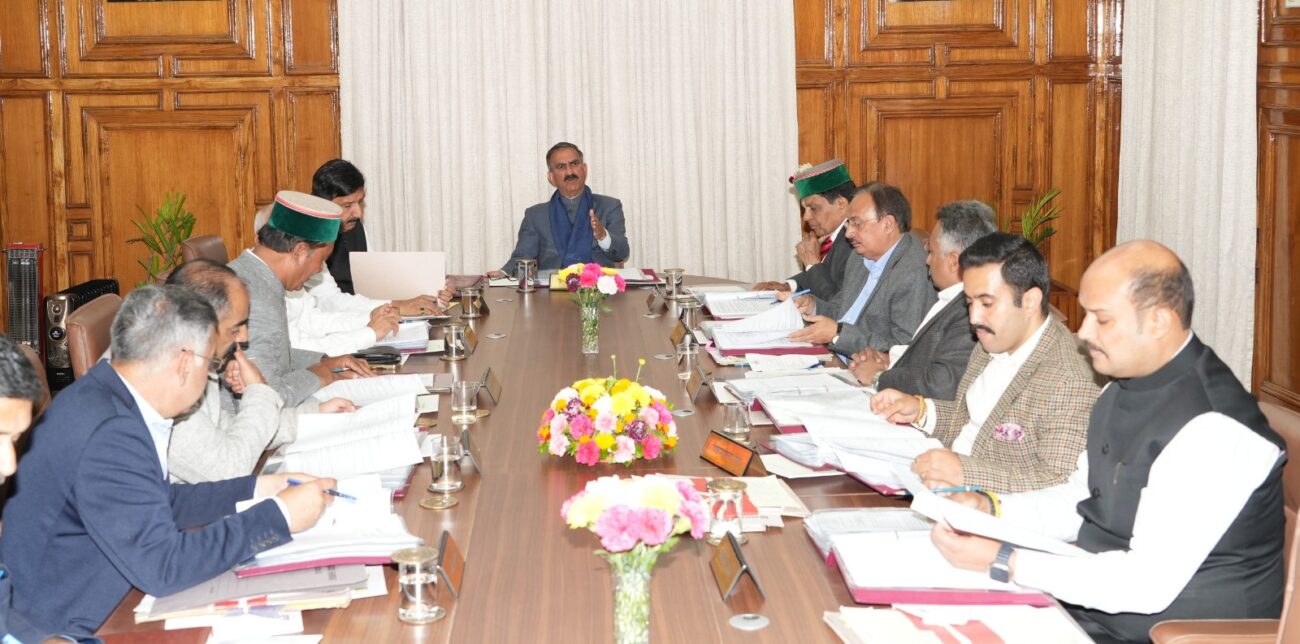Himachal Pradesh cabinet on Saturday approved multiple welfare schemes and recruitment drives in a meeting chaired by Chief Minister Sukhvinder Singh Sukhu at the State Secretariat. The decisions focus on healthcare strengthening, employment generation, education support, and sustainable development initiatives.
In a significant move to address healthcare staffing shortages, the cabinet approved recruiting 400 staff nurses with a monthly honorarium of Rs 25,000. The nurses will be deployed across six medical colleges, one super specialty hospital, and approximately 50 model hospitals operating statewide. The government also approved creating a comprehensive new Resident Doctors Policy-2025 to regulate appointments, postings, and career progression for medical professionals in government institutions.
The cabinet gave in-principle approval to the Health Department’s proposal to prepare a detailed policy-scheme for regulating assistant staff nurse appointments. Additionally, 32 assistant professor posts were transferred to Emergency Medicine departments across IGMC Shimla’s super specialty wing, Dr. Rajendra Prasad Government Medical College Tanda, Shri Lal Bahadur Shastri Government Medical College Nerchowk, and Dr. Radhakrishnan Government Medical College, strengthening emergency healthcare capacity.
Construction work on newly selected land for the expansion of Nahan Medical College received cabinet approval, along with ex-post facto permission to regulate admissions to new postgraduate and super specialty courses in the Medical Education and Research Department.
Addressing unemployment concerns, particularly among educated youth where joblessness stands at 29.6 percent, the cabinet approved filling 300 posts of Junior Office Assistant (IT) in the Recruitment Directorate. These positions will be created as job trainees in the first phase, establishing a specialized state cadre for information technology support staff.
The cabinet approved including 19 additional sports in the list of disciplines whose meritorious players become eligible for government job appointments. The newly included sports are baseball, para sports, rugby, triathlon, deaf games, mallakhamb, kudo, motor sports, pencak silat, shooting ball, soft tennis, roll ball, tenpin bowling, tug of war, fencing, netball, sepak takraw, wushu, and kickboxing. This expansion recognizes sporting excellence beyond traditionally favored games.
In welfare measures benefiting thousands of workers, the cabinet granted ex-post facto approval for increasing monthly honorarium by Rs 500, effective from April 1, 2025. This covers SMC teachers (TGT, C&V, JBT, lecturers, DPE), IT teachers employed in government schools, mid-day meal workers, and part-time water carriers serving remote areas. Additionally, 510 special police officers will receive a Rs 300 monthly honorarium increase—403 in non-tribal areas and 107 in tribal areas.
Education received a significant boost through amendments to the Dr. Yashwant Singh Parmar Student Loan Scheme. Education loans at one percent interest rate will now be provided for postgraduate education, while the family income eligibility limit has been increased from Rs 4 lakh to Rs 12 lakh annually. This expansion provides access to higher education financing for middle-income families who previously fell outside the scheme’s purview.
In a progressive move toward gender equality, the cabinet approved granting 15 days of paternity leave to male contract employees across the state, bringing them on par with regular government employees in terms of parental benefits. This decision affects thousands of contract workers employed in various departments.
The government sanctioned converting 1,000 existing diesel and petrol taxis to electric vehicles under the Rajiv Gandhi Self-Employment Scheme with a substantial 40 percent subsidy to taxi operators. This represents a significant push toward sustainable transportation in the ecologically sensitive hill state, where vehicular emissions contribute to air pollution in popular tourist destinations.
The cabinet approved amendments to solar energy project schemes, now renamed the Rajiv Gandhi Self-Employment Solar Energy Scheme. Interest subsidies will be provided for ground-mounted solar projects from 100 kilowatts to 2 megawatts—five percent interest subsidy in tribal areas and four percent in non-tribal areas. This encourages renewable energy entrepreneurship among state residents.
Recognizing tourism’s critical role in Himachal’s economy, the cabinet established a Tourism Investment Promotion Council to attract and facilitate tourism investment efficiently and transparently. The council will work on mechanisms to evaluate and process investment proposals in the sector.
The cabinet designated Himachal Pradesh General Industries Corporation as the nodal agency for purchase, storage, transport, quality testing, and supply of extra neutral alcohol and spirits used by pharmaceutical units in the state. This centralization aims to streamline the supply chain for the pharmaceutical industry concentrated in industrial areas like Baddi.
A cabinet sub-committee was formed under Revenue Minister Jagat Singh Negi to finalize comprehensive rural area development guidelines. These guidelines will be adopted by gram panchayats as model sub-rules for regulating construction activities in villages, aiming to prevent arbitrary building that has marred rural landscapes. Rural Development Minister Anirudh Singh, Urban Development Minister Vikramaditya Singh, and Town and Country Planning Minister Rajesh Dharmani will serve as members of this sub-committee.
Three new government primary schools will open in Haripur Sandholi-2, Surajmajra Lubana in Solan district, and Chakkan in Baddi block, addressing gaps in educational infrastructure in these developing areas.
The cabinet also approved panchayat reorganization, with the Rural Development and Panchayati Raj Department tasked with initiating the process according to established rules. Officials noted that reorganization work could not be completed earlier due to natural disasters that struck the state during monsoons.
The cabinet approved amendments to the Himachal Pradesh Town and Country Planning Rules, 2014, in reference to the Special Assistance Scheme for Capital Investment to States 2025-26, facilitating infrastructure development projects.
The cabinet approved the proposal to streamline implementation and efficient monitoring systems for the Natural Farming Prosperous Farmer Scheme and Himachal Pradesh Crop Diversification Project (JICA Phase-2). This system will promote coordination between departments, SPNFF, and JICA while ensuring efficient governance and implementation with expected results under major programs.
These cabinet decisions reflect the government’s focus on healthcare strengthening, employment generation, sustainable development, and welfare measures for workers across various categories. The emphasis on electric vehicles, solar energy, and tourism investment indicates priorities aligned with Himachal’s ecological sensitivity and economic structure. The recruitment drives in healthcare and IT sectors address critical staffing gaps, while enhanced student loans and honorarium increases provide financial relief to specific beneficiary groups.





